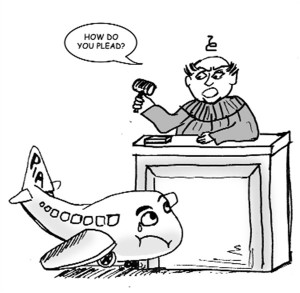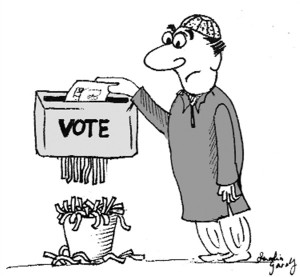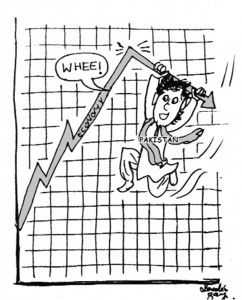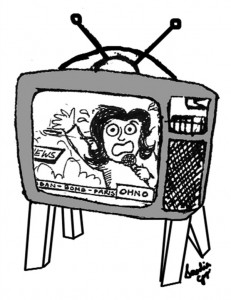
Pros and cons
Sir,
As the Yemeni crisis brews, Saudi Arabia’s pressure on Pakistan to meet its demand for outright military support continues to increase. Saudi Arabia strongly desires that Pakistan should openly come forward and fully commit itself to support Saudi Arabia against its ongoing war in Yemen. Can Pakistan make such an outright commitment? Particularly after passing of the resolution in the Parliament, it cannot.
Undeniably, Pakistan is caught in a very sticky situation. The severity of the situation can be gauged from the statement of the visiting Saudi Minister for Religious Affairs, Saleh bin Abdul Aziz, made during an interview with a TV channel, that on the one hand there are the rebels in Yemen and on the other there is a legal government, and in such a situation talking about mediation is nothing but a joke. What he plainly meant was that the Saudi government is not willing to accept any restrained commitment on its demand for military support from Pakistan. It expects Islamabad to vociferously announce its unflinching support for Riyadh.
Prime Minister Nawaz Sharif did make a sincere but futile attempt in his address to the representatives of Pakistan’s print and electronic media, on April 13, to clarify Pakistan’s position. His efforts to convince the Saudis about Pakistan’s standpoint on the issue failed to achieve the desired objective. Because what he said, after a top level meeting of the civil and military leadership, was nothing different from what the joint sitting of the parliament had stated in its resolution. Prime Minister Nawaz Sharif, in fact, only highlighted some portions of the resolution and attempted to pacify the Saudis. He did so because he thought perhaps the Saudis may not have fully understood the fundamental message of the resolution.
Are the Saudis convinced? The answer is no, at least when seen in the backdrop of the remarks of the visiting Saudi minister and the loud and clear signals emanating from quarters that matter in the Kingdom that Pakistan must resolutely announce its commitment to meet Saudi demand for complete military support comprising of army, navy and air force. Nothing less than this would perhaps be acceptable to them.
What should Pakistan do to get out of this quagmire? The options are limited. Pakistan should make a last-ditch effort to convince those at the helm in the Saudi government that if diplomatic efforts to resolve the issue fail, and the sovereignty and sanctity of the Holy Land stands threatened, it would extend support to Saudi Arabia. If the Saudis do not agree with Pakistan’s proposition of finding a diplomatic solution to the problem, Pakistan will have to seriously weigh the pros and cons of meeting or not meeting the Saudi demand, and act accordingly.
M Fazal Elahi,
Islamabad.
Clear the air

Sir,
The European Union’s imposition of sanctions on PIA, an airline regulated by the Civil Aviation Authority, was a consequence of the failure of its regulatory functions. And so are numerous unresolved fatal air crashes that took the lives of hundreds of passengers, whose families await compensation and closure. Pakistan’s aviation industry has suffered because of the politicization of CAA, its failure to perform its regulatory duty free from threats and intimidation, and a culture of corruption and mediocrity that dominates its corridors.
There are an estimated 4,000 ghost employees in the CAA, and over the years the organization has become hostage to political cronies, nepotism and mediocrity. Between 2010 and 2012, an organized mafia in the CAA was responsible for the biggest security breaches. Its officials at Karachi Airport allowed non-scheduled airlines to land, park and depart, with no records or documentation and billions lost in landing and parking fees, pocketed by them. Nobody has been punished so far, nor has the lost revenue been recovered.
These activities left major gaps in security, such as dangerous cargo or non-manifested crew or personnel entering the city without documentation. As it is, Karachi’s infrastructure has collapsed, its population is expanding, and its criminal economy is posing a threat to the lives of its citizens.
It is also time Pakistan’s state-run corporations, with thousands of employees from upcountry, are relocated to Islamabad, to provide some breathing space to this already over congested city, where even a basic necessity like water has become a rare commodity, and half the city is shut down by frequent calls for strikes in an endless battle for turf that has consumed thousands of lives.
Rahat Siddiqi,
Karachi.
Evil plots

Sir,
The problems faced by residents of various cantonment boards are created by the nexus between real estate dealers and the autocratic monopolistic attitude of the bureaucracy that holds executive assignments. There is no end to this in sight, even with the coming Cantonment Board elections, because those tasked to give out party tickets and manage election campaigns are controversial men, notorious for their involvement in land scams.
Residents of Karachi’s cantonment board areas and the DHA continue to face a shortage of clean running water, although they have been forced to pay huge sums of money in water bills to the Cantonment Board in decades. Another problem is the disappearance of amenity plots, most of which have been converted into commercial or residential.
The residents of other cities and areas face similar problems, left at the mercy of powerful land dealers and corrupt officials, who are indifferent to basic civic problems faced by the residents. Green belts are being replaced by concrete jungles with devastating effects on the environment. While urban population is rising, the country’s net agriculture and farm produce is diminishing. Large chunks of agricultural land developed over decades to feed residents of cities are being converted into real estate plots.
Rashid Orakzai,
Islamabad.
A message for the young
Sir,
The following excerpt from a speech delivered by Quaid-e-Azam in April 1948, on the responsibilities of Pakistani youth, continues to provide guiding principles for the young Pakistanis of today:
“Now that we have achieved our national goal, you will expect me to give you a bit of advice regarding the manner in which we can put our shoulders behind the most difficult and important task of building up our new State into what we all wish it to be; namely one of the greatest States in the world.
The first thing you should do is to learn to appreciate the difference in the approach to the problems with which we are faced now, in contrast with those which were facing us when we were struggling for our independence. During our struggle for the achievement of Pakistan we were critical of the Government which was a foreign Government and which we wanted to replace by a Government of our own. In doing so we had to sacrifice many things including the academic careers of our younger generation. May I say that you played your part magnificently. Now that you have achieved your goal that is, a Government of your own, and a country which belongs to you and in which you can live as free men, your responsibilities and your approach to the political, social and economic problems must also change.
The duties required of you now are: develop a sound sense of discipline, character, initiative and a solid academic background. You must devote yourself whole-heartedly to your studies, for that is your first obligation to yourselves, your parents and to the State. You must learn to obey for only then you can learn to command. In your criticism of the Government you must learn to be constructive. Government welcomes constructive criticism. You can make a big contribution towards bringing about harmony and unity where for personal and other selfish considerations some people may adopt courses which are likely to lead to disruption and disunity. Remember that your Government is like your own garden. Your garden flourishes by the way you look after it and the efforts that you put towards its improvement. Similarly, your Government can only flourish by your patriotic, honest and constructive efforts to improve it.”
Zahid Khan,
Islamabad.
Flight of capital

Sir,
The foreign remittances, volume of trade, and award of contracts by Indians based in UAE and Saudi Arabia to their country far exceed the total money remitted through regular channels by Pakistanis or trade and contracts owned by them. The only difference is that investment by Indians in UAE does not involve its ruling elite, or serving and retired members of establishment, but is dominated by businessmen.
The annual foreign remittance by Pakistani workers based in UAE is in the range of $3.6 billion, whereas according to estimates about $4.5 billion were taken out of Pakistan illegally for investment in the Emirates in 2014. It is not the UAE that is to be blamed, but the Pakistani facilitators of the criminals involved in this illegal flow of foreign exchange out of the country through its four major international airports and through large smuggling boats along Pakistan’s coastal belt, with the connivance of security, custom and coastguard officials.
Ali Malik,
Lahore.
Hostel hazards

Sir,
While private hostels provide facilities to the students in Islamabad and other large cities, they can also become a serious security threat. Although most of their residents are students and office workers, there is no significant mechanism to verify the backgrounds of people who live in these hostels.
This problem is especially serious in the context of the ongoing operations against terrorism all over the country, when there is a need for special vigilance.
The government should devise a proper mechanism to ensure such hostels are secure, and are not a threat to other people’s security.
Abdul Ghaffar Khokhar,
Islamabad.
Ad mad

Sir,
With the arrival of electronic media in our country because of the liberal policies of former military ruler Gen Pervez Musharraf, Pakistanis are blessed with a large number of source of news, entertainment and information. But at times, our electronic media has failed miserably in fulfilling its basic obligations, especially because of commercial reasons.
Viewers are forced to tolerate advertisement for long periods of time, even during the news hour. Many of these ads are aesthetically so poor that they cause a headache, while others don’t meet the basic ethical requirements of advertising. The same words or phrases are repeated over and over again, until one is fed up and changes the channel, only to experience similar ads on the other channel too.
People who have watched international news channels are used to watching the news uninterrupted, but on Pakistani channels even the news are interrupted by ugly and senseless commercials. They are especially disrespectful when the news being reported are of a serious or tragic nature. It seems that they have no hearts and no sympathy for fellow human beings.
It is true that these television channels are commercial enterprises and advertising is their only source of income, but that doesn’t mean that their sole aim must be to make as much money as possible.
Many of these ads are so distasteful, that they do more harm than good to the prception of the products they advertise.
Aamir Aqil,
Lahore.
Not our war

Sir,
Pakistan was created by men of honor, character and vision, like Quaid-e-Azam and Allama Iqbal, so that its citizens could enjoy the security of life and property, and freedom of expression and religious practice. For any sovereign state to survive and prosper, the goal of all the institutions funded by taxpayers must be solely to serve the people. This objective can only be achieved with the supremacy of the constitution – the edifice on which a modern state is built, defining role of every institution and holding them accountable.
Economic self reliance, without which state sovereignty cannot be sustained, can only be achieved through tax collection, to allow investment in education and health and in developing human resources that are so vital for development. For five decades, we have witnessed a culture of institutionalized tax evasion, relying on financial grants from donors and so called friendly countries, while encouraging massive flight of capital by a few corrupt members of the ruling elite, the establishment, and the business community. We have been reduced to a state which an assistant to the deputy minister of a Gulf state openly rebuked.
Pakistan is engaged in a war and our troops are combating terrorists spread all over our country that pose us an existential threat, yet there is talk of sending soldiers to fight somebody else’s war in Yemen. If peace and writ of the state had been restored in Pakistan, we could debate sending troops to help restore peace in other countries.
The terrorists that Pakistan is fighting against are demons that we created by getting involved in proxy wars. We tend to bargain our sovereignty for a few billion dollras, but are not willing to eliminate organized flight of capital of up to $6 billion annually through illegitimate channels by land, air and sea.
More than $50 billion were doled out to Ziaul Haq and another $20 billion to Musharraf for our role in other people’s wars, but the money has disappeared. It went into into private foreign bank accounts as Pakistan became poorer and poorer, its industry was shut down, and hundreds of thousands of our citizens were killed because of terrorism.
Tariq Ali,
Lahore.

